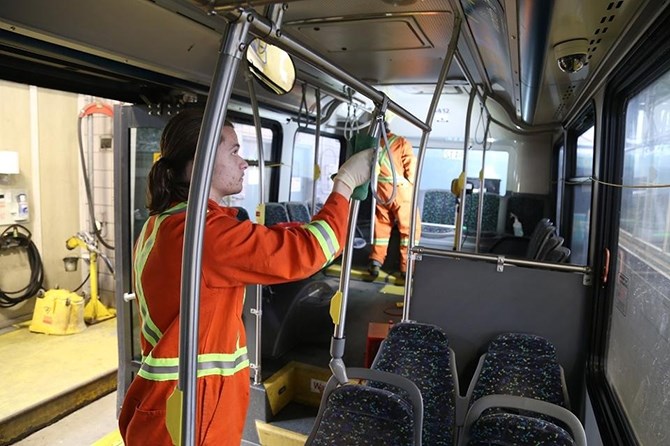
BC Transit says it has stepped up cleaning procedures in an effort to increase safety of its transit passengers during the COVID-19 outbreak.
Image Credit: SUBMITTED/ BC Transit
March 23, 2020 - 7:00 AM
For some, it might seem odd that buses are running while everyone is supposed to stay home and maintain ‘social distance’ to prevent the spread of coronavirus, but transit is an essential service.
But public transit is also how many people employed in essential services — grocery store workers, city staff, health care workers, cleaners etc. — get to work.
Bus drivers are also potentially at risk of catching coronavirus so to protect workers, the public and ensure the buses keep running, drivers and riders need to observe and adhere to a few changes.
“We recognize we have drivers and front line staff that have public interaction. Our drivers have access to on-road support during their shift, and we have implemented enhanced cleaning measures on our buses and in our facilities to support our drivers and our customers,” B.C. Transit said in an email.
While she wasn’t specific, public health officer Dr. Bonnie Henry said this week people need to work together to at least six feet apart from everyone else on the bus. That also might mean you need to wait for the next bus if there are too many riders.
B.C. Transit says it is following the lead of Health Canada and the province and stepping up daily cleaning and disinfecting for high touch areas including stanchions, hand straps, stop buttons, doors and seat tops.
Bus riders are expected to stand behind the red line on the bus to give the driver more room and space, moving around the bus to an open space or checking passenger loads on NextRide to choose another bus as appropriate.
“The Province of B.C. has notified us we are not included in the 50-person limits as we are an important service to transport people to work, including hospitals and other destinations, such as grocery shopping,” B.C. Transit said.
B.C. Transit says it will continue to monitor the situation, maintaining close contact with regional health authorities and other transit agencies to determine best practises and an appropriate response.
“We have an internal Emergency Operations Team that as the situation progress is ready and prepared to implement additional measures, if necessary, and adjust our strategy,” B.C. Transit said.
The transit system is also asking public transit riders to help keep the system safe by following guidelines set out by the Canadian Public Health Agency. Those guidelines include washing hands with soap often, coughing into your sleeve or into a tissue, avoiding touching your eyes, face, nose and mouth, and staying home if feeling unwell.
Further changes to the operation will be made based on health advice, operational needs and in consultation with local governments.
To contact a reporter for this story, email Steve Arstad or call 250-488-3065 or email the editor. You can also submit photos, videos or news tips to tips@infonews.ca and be entered to win a monthly prize draw.
We welcome your comments and opinions on our stories but play nice. We won't censor or delete comments unless they contain off-topic statements or links, unnecessary vulgarity, false facts, spam or obviously fake profiles. If you have any concerns about what you see in comments, email the editor in the link above.
News from © iNFOnews, 2020